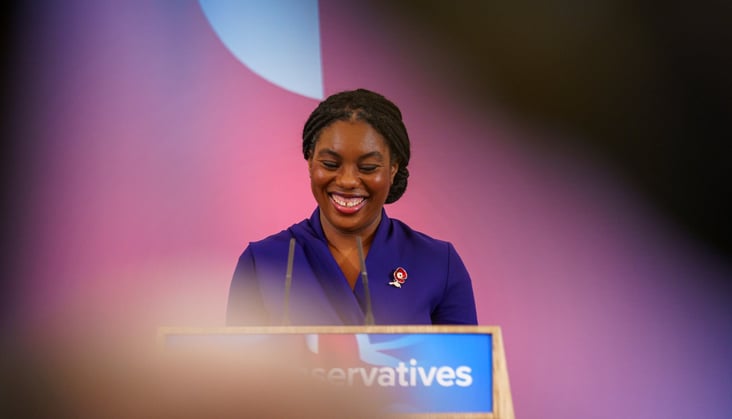
Faith Nyasuguta
On Saturday 2 November, Kemi Badenoch won the Conservative Party leadership contest, becoming the fourth woman and first black person to head the UK’s oldest political party.
Badenoch’s ascent as leader of the UK’s Conservative Party represents a deeply impactful personal and political milestone. Born in Wimbledon, UK, in January 1980 as Olukemi Olufunto Adegoke, Badenoch’s story began when her parents returned with her to Nigeria, where she would spend her early years. In her maiden speech to the British House of Commons in 2017, Badenoch acknowledged her unique perspective: “To all intents and purposes, I am a first-generation immigrant.”
As a child, Badenoch enjoyed the privileges of her British citizenship- “ something she has likened to a “golden ticket” from Charlie and the Chocolate Factory, allowing her entry into opportunities unimaginable to many. This citizenship, she notes, was granted just before Britain’s Nationality Act of 1981, which ended automatic birthright citizenship.
Growing up in Nigeria, Badenoch’s life contrasted significantly with the one she would later experience in the UK, shaping her worldview in ways that would resonate with Africans and immigrants seeking new beginnings abroad.

At 16, Badenoch returned to the UK, arriving in 1996- ”a country where Black or Asian citizens had yet to reach government positions. She was alone and only had $130 in her pocket. Her parents had sent her to the United Kingdom, where she could forge a better life, away from the political chaos of her home country and the military regime. When not at school, she supported herself by working at McDonald’s.
Feeling like an outsider in many ways, Badenoch recalls being “a very angry young person” drawn to conservative politics out of frustration. Her frustration stemmed from encountering Western assumptions about Africa that minimized or overlooked African voices and contributions.
Today, Badenoch asserts that Britain is “the best country in the world to be Black,” though she recognizes her views can be divisive. While three-quarters of Black Britons found meaning in the anti-racism message of the Black Lives Matter (BLM) protests in the UK, Badenoch cautioned against adopting American racial conflicts.
As a proponent of Tony Sewell’s review on ethnic disparities, she aimed to show Britain’s racial progress, while balancing a message that there is still room for growth. Her “Inclusive Britain” agenda as equalities minister took a practical approach to close racial and economic gaps.

While Badenoch opposes “identity politics,” her own views often touch on racial and cultural themes. In an interview, she famously described herself as “Labour’s worst nightmare,” alluding to her commitment to conservative values that challenge common stereotypes around race and ethnicity.
Her identity-driven approach sometimes attracts contrasting opinions, with some conservatives calling her “woke” while others see her as too far-right on race and gender. When asked during a leadership debate whether the “culture wars” should end, Badenoch replied, “We are defending our culture, we are defending our country,” expressing a resistance to the idea of avoiding difficult cultural issues.
Badenoch’s conservative vision, which includes limiting the role of the state, contrasts with the Labour Party’s more inclusive, expansive social programs. Keir Starmer, the leader of the Labour Party, may avoid directly debating Badenoch on identity-related policies to focus on their contrasting economic philosophies instead. But in an increasingly multicultural UK, Badenoch’s stances on race and national identity will be critical discussion points.
Her leadership bid faced fierce competition. Initially, her path to the top was almost derailed by Robert Jenrick, who tried to appeal to hardline Conservatives with promises to restrict immigration and human rights in hopes of winning back votes lost to populist figures. However, the Tory membership defied stereotypes, choosing Badenoch over the more extreme approaches proposed by Jenrick.
Interestingly, by not pursuing extreme policies, Badenoch garnered unlikely allies, such as former Conservative Chancellor George Osborne. Through her approach, she has managed to unify various factions of the Conservative Party, despite remaining a polarizing figure to the wider British public.

Badenoch’s rise, though, is not just about her political positions; it’s about the resilience and adaptability she developed from her diverse life experiences. For Africans and other immigrants, Badenoch’s story represents a journey of persistence, strength, and a testament to the complex interplay of identity in a globalized world. Her path demonstrates that cultural heritage can coexist with new allegiances, and for many, she embodies a form of success and influence that could inspire African immigrants and people of color worldwide.
Badenoch’s tenure as Conservative leader—and her unique perspective on Britain’s multicultural future—will undoubtedly shape the nation’s political dynamics. As she steps into this new role, her approach to race, culture, and governance will not only impact the UK but also resonate with African and Afro-diasporic communities, who see in her both a reflection of their challenges and the potential for transformative influence. Her journey from Nigeria to one of the UK’s most powerful positions illustrates the global reach and impact of African voices in shaping modern society.
RELATED:








